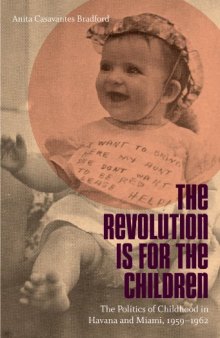 جزییات کتاب
جزییات کتاب
Since 1959, the Cuban revolutionary government has proudly proclaimed that "the revolution is for the children." Many Cuban Americans reject this claim, asserting that they chose exile in the United States to protect their children from the evils of "Castro-communism." Anita Casavantes Bradford's analysis of the pivotal years between the Revolution's triumph and the 1962 Missile Crisis uncovers how and when children were first pressed into political service by ideologically opposed Cuban communities on both sides of the Florida Straits. Casavantes Bradford argues that, in Havana, the Castro government deployed a morally charged "politics of childhood" to steer a nationalist and reformist revolution toward socialism. At the same time, Miami exile leaders put children at the heart of efforts to mobilize opposition to Castro's regime and to link the well-being of Cuban refugees to U.S. Cold War foreign policy objectives. Casavantes Bradford concludes that the 1999 Elian Gonzalez custody battle was the most notorious recent manifestation of the ongoing struggle to define and control Cuban childhood, revealing the persistent centrality of children to Cuban politics and national identity.



 دانلود کتاب
دانلود کتاب

 جزییات کتاب
جزییات کتاب


 این کتاب رو مطالعه کردید؟ نظر شما چیست؟
این کتاب رو مطالعه کردید؟ نظر شما چیست؟
